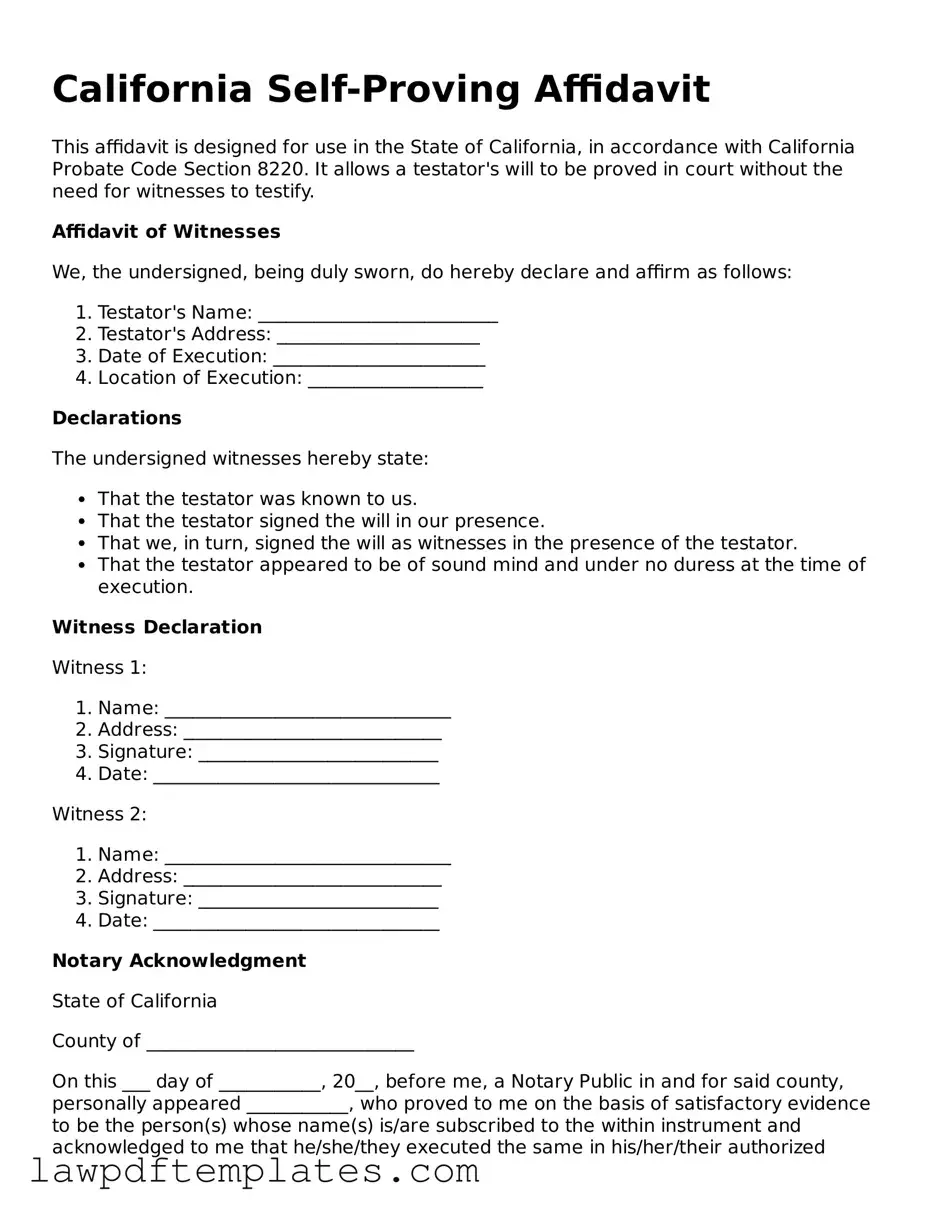Free Self-Proving Affidavit Template for the State of California
Form Breakdown
| Fact Name | Description |
|---|---|
| Definition | A California Self-Proving Affidavit is a legal document that confirms the authenticity of a will. |
| Governing Law | This affidavit is governed by California Probate Code Section 6110. |
| Purpose | It allows a will to be accepted in court without the need for witnesses to testify. |
| Signature Requirement | The testator and witnesses must sign the affidavit in the presence of each other. |
| Notarization | The affidavit should be notarized to enhance its validity. |
| Use in Probate | This document streamlines the probate process by reducing the need for witness testimony. |
| Form Availability | Self-Proving Affidavit forms can typically be found online or at legal stationery stores in California. |
Sample - California Self-Proving Affidavit Form
California Self-Proving Affidavit
This affidavit is designed for use in the State of California, in accordance with California Probate Code Section 8220. It allows a testator's will to be proved in court without the need for witnesses to testify.
Affidavit of Witnesses
We, the undersigned, being duly sworn, do hereby declare and affirm as follows:
- Testator's Name: __________________________
- Testator's Address: ______________________
- Date of Execution: _______________________
- Location of Execution: ___________________
Declarations
The undersigned witnesses hereby state:
- That the testator was known to us.
- That the testator signed the will in our presence.
- That we, in turn, signed the will as witnesses in the presence of the testator.
- That the testator appeared to be of sound mind and under no duress at the time of execution.
Witness Declaration
Witness 1:
- Name: _______________________________
- Address: ____________________________
- Signature: __________________________
- Date: _______________________________
Witness 2:
- Name: _______________________________
- Address: ____________________________
- Signature: __________________________
- Date: _______________________________
Notary Acknowledgment
State of California
County of _____________________________
On this ___ day of ___________, 20__, before me, a Notary Public in and for said county, personally appeared ___________, who proved to me on the basis of satisfactory evidence to be the person(s) whose name(s) is/are subscribed to the within instrument and acknowledged to me that he/she/they executed the same in his/her/their authorized capacity(ies), and that by his/her/their signatures on the instrument the person(s), or the entity upon behalf of which the person(s) acted, executed the instrument.
I certify under penalty of perjury under the laws of the State of California that the foregoing paragraph is true and correct.
WITNESS my hand and official seal.
____________________________________
Notary Public
Common mistakes
Filling out the California Self-Proving Affidavit form can be straightforward, but mistakes often occur that can undermine its effectiveness. One common error is failing to include all required information. Each section of the form has specific details that must be completed, including the names of witnesses and the testator. Omitting any of these details can lead to complications in validating the will.
Another frequent mistake is not having the affidavit signed in the presence of a notary. The purpose of the Self-Proving Affidavit is to simplify the probate process, but this is only achieved if the document is properly notarized. Without a notary’s signature, the affidavit may not hold up in court, potentially causing delays and additional legal challenges.
People also sometimes overlook the importance of having the witnesses sign the affidavit. It is not enough for the testator to sign alone; witnesses must also add their signatures to confirm their presence during the signing of the will. Neglecting this step can render the affidavit ineffective, as it may not meet the necessary legal requirements.
Inaccurate information can be another pitfall. Providing incorrect names, addresses, or dates can create confusion and lead to disputes later on. It is essential to double-check all entries for accuracy. This attention to detail can save time and prevent complications during the probate process.
Finally, individuals may fail to keep copies of the completed affidavit. After filling out the form, it is crucial to retain a copy for personal records. This ensures that all parties involved have access to the document if questions arise in the future. Keeping a well-organized record can facilitate smoother proceedings and provide peace of mind.
Discover More Self-Proving Affidavit Templates for Specific States
Self-proving Affidavit - This document promotes efficiency in settling estates by addressing potential challenges upfront.
When engaging in the sale or purchase of residential property in Texas, it is vital to properly understand the Texas TREC Residential Contract form, as it serves to eliminate misunderstandings between parties. This contract, which outlines essential aspects such as financing, inspections, and closing arrangements, is endorsed by the Texas Real Estate Commission (TREC). To assist you further, you can find a comprehensive resource on how to fill out this form at texasformspdf.com/fillable-texas-trec-residential-contract-online.
How to Write a Will in Massachusetts - Self-Proving Affidavits can be prepared by legal professionals or individuals.
